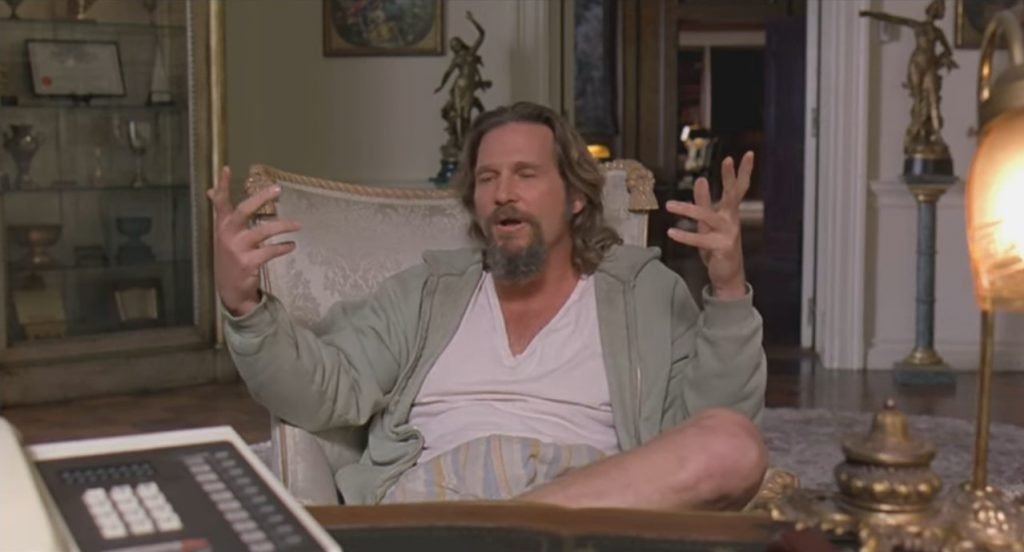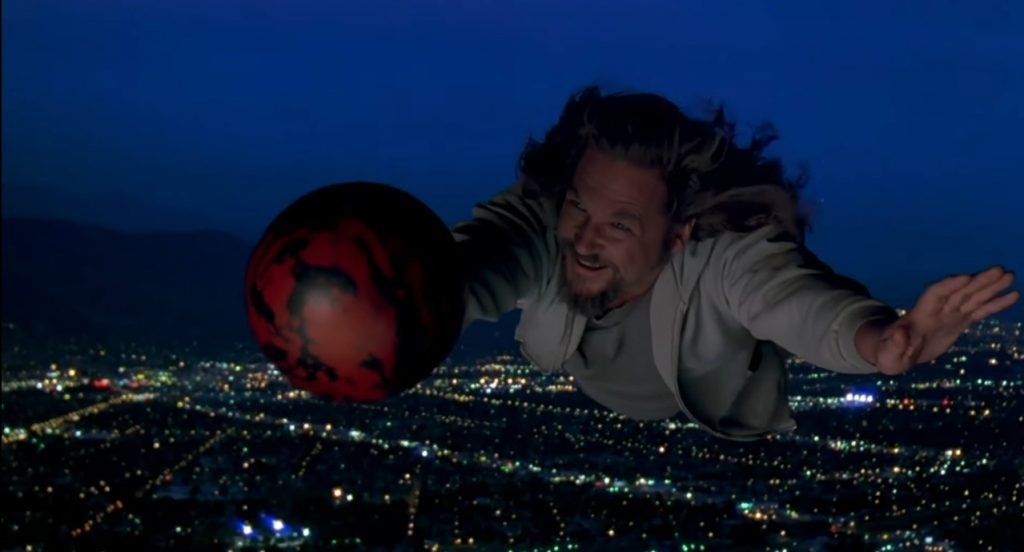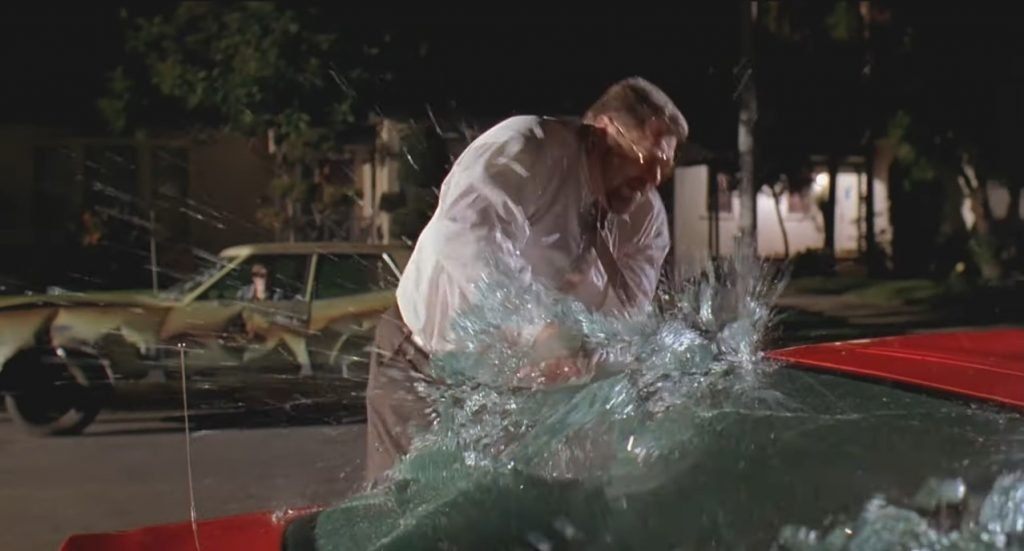In the time when films with morally ambiguous heroes and convoluted stories set up in lands ruled by pessimism and cynicism flourished once again after decades, The Big Lebowski failed to impress audiences and even critics such as Roger Ebert. But, today, times have changed. Like it always does, with every other Coen Brothers’ film.

Warning: Spoilers Ahead
“Way out west there was this fella… fella I wanna tell ya about. Fella by the name of Jeff Lebowski…”
Following a fairly captivating narrative prologue set up by the mustached Sam Elliott, here comes a more-than-casual Jeffrey ‘Dude’ Lebowski (played by Jeff Bridges) postdating a $0.69 check at the local supermarket by over one year. As we are introduced to the laziest man in Los Angeles County, the next two hours pass by rather seamlessly.

The Big Lebowski—written and directed by the Coen brothers, starring John Goodman, Steve Buscemi, Julianne Moore, John Turturo, a very funny Philip Seymour Hofman and a whole lot of others alongside Jeff Bridges playing the titular role, Jeffrey ‘Dude’ Lebowski—is considered to be one of the most well written comedy screenplays. It earned not half of its budget at the time of its release. The film, then overlooked by audiences and critics alike, now is deemed a cult classic—to use the parlance of our times.
When the protagonist is pulled into a world against his will, when he becomes a part of the grander scheme of things without his knowledge, one thing leads to another as the hero in him rises to the occasion. Everything explodes into a fitting payoff as strings of standalone incidents become one.
No, this is not about The Big Lebowski. This should’ve been The Big Lebowski had the second and third acts been written by someone but the Coen brothers. This movie was made back in the 90’s, mind you. Back when film noir started blowing up once again. Arguably, the reason why the movie holds up well to this day is because noir is still one of the most revisited genres alive today.
But what sets The Big Lebowski apart and ahead of its time is its daring, unconventional take on a traditional narrative. It’s a noir, sure. It isn’t just any noir, though. The film constantly breaks every archetype of film noir, particularly towards the end by killing off *spoiler* Steve Buscemi’s character for apparently no good reason.
At one point in the film, was it Jackie Treehorn all along, you wonder. You’re on the cusp of the seat and wouldn’t mind sneaking a look at his notepad if he lets you. The camera dramatically zooms into his notepad. El Duderino runs over to the bar noiselessly, on the verge of saving ‘Bunny’ Lebowski.
Amidst a tense build-up shot and an intense music keying into a major reveal, it is only when you end up looking at a ridiculously profane sketch that has absolutely nothing to do with whatever everybody is looking for, you’d bet this isn’t like any other film.

From stylized dream sequences to a thousand White Russians (meant the cocktail) being drunk throughout, these scenes ideally should not work as it does. A simple retelling of the story on paper comes off as trying-too-hard. It still works amazingly well and manages to score a laugh or two every now and then. It all comes together magically, thanks to The Dude and the people around him.
An umpteen number of bowling sequences—stacked up from start to end—stand for the metaphorical depiction of American hypocrisy, claim a few who’ve gone the extra mile to dig deeper and beyond the surface. But, what these scenes at the bowling alley do manage to accomplish on the surface, and right on your face, is a seamless setting up of the major characters. Having been used to the idiosyncrasies of every character over time, you can almost get yourself to believe that they are indeed stupid enough to actually go through all this trouble for nothing.
An ever-so-wrong Walter Sobchak (Am I wrong? He asks the entire film ever so confidently, you just couldn’t say if he is) throws a fit in the wrongest of times as he’s there in the middle of the road in the dead of night, pounding down on a brand new four-wheeler in one of the movie’s funniest scenes.

The audience goes through the same emotions The Dude does as anybody could easily tell this power move isn’t gonna end well for anyone. But one can’t complain, having known how mercurial the guy is. That, right there, is the level of indulgence The Big Lebowski has to offer. The more and more The Dude drives himself and his friends into the lives of the strangers he suspects, the more and more he finds himself to be wrapped around a load of nonsense in the name of an overarching mystery.
The Big Lebowski takes the independence of the medium into hands by constantly taking the audience for a bunch of no-good detectives. We’ve waited and waited for reveals to blow us away. We see this, We see that, is this what it is gonna be? No? Here, the mystery doesn’t take the driving seat. The eccentric ensemble do. And it’s one hell of a ride they take us through, I tell you.

The masterful performance from the main cast that tries to get to the bottom of it all alongside the viewers is just enough for us to feel gratified when they go as bananas as we do, perhaps even more, when the credits roll.
The Big Lebowski is, by far, the proud owner of the most quotable dialogues ever spoken. If the film still leaves you behind with an aching that there was no big twist, maybe next time, try considering that very fact, by itself, to be the twist that you were looking for all long.
“It’s good knowin’ he’s out there. The Dude. Takin’ ‘er easy for all us sinners.”


